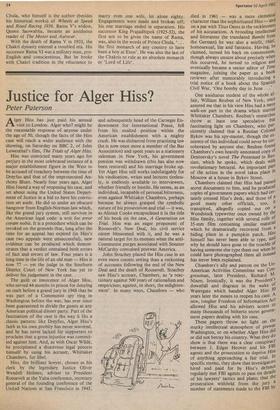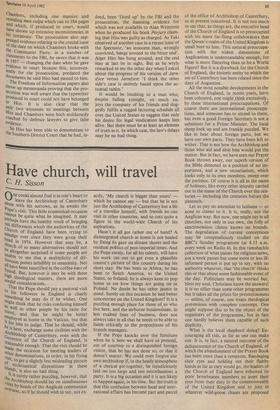Justice for Alger Hiss?
Peter Paterson
Ager Hiss has just paid his annual visit to London. Alger who? might be the reasonable response of anyone under the age of 50, though the facts of the Hiss case will reach a wider audience with the showing, on Saturday on BBC 2, of John Lowenthal's film, The Trials of Alger Hiss.
Hiss was convicted many years ago for perjury in the most celebrated instance of a major establishment figure in the West to be accused of treachery between the time of Dreyfus and that of the unprosecuted An- thony Blunt. Nearly four years ago, Alger Hiss found a way of reopening his case, and set about suing the United States Depart- ment of Justice in a bid to have his convic- tion set aside. He did so under an obscure hangover from English-Norman law which, like the grand jury system, still survives in the American legal code: a writ for error coram nobis. It is a procedure which can be invoked on the grounds that, long after the time for an appeal has expired (in Hiss's case two appeals were unsuccessful), new evidence can be produced which demon- strates that a verdict contained both errors of fact and errors of law. Four years is a long time in the life of an old man — Hiss is now 77 — yet the judge in the Southern District Court of New York has yet to deliver his judgement in the case.
The guilt or innocence of Alger Hiss, who served 44 months in prison for denying on oath before a grand jury in 1948 that he was part of a Communist spy ring in Washington before the war, has ever since been guaranteed to divide the guests at any American political dinner party. Part of the fascination of the case is the way it fits a classic pattern: like Dreyfus, Alger Hiss's faith in his own probity has never wavered, and he has never lacked for supporters to proclaim that a gross injustice was commit- ted against him. And, as with Oscar Wilde, he precipitated a disastrous legal process himself by suing his accuser, Whittaker Chambers, for libel.
Hiss, the brilliant lawyer, chosen as his clerk by the legendary Justice Oliver Wendell Holmes, adviser to President Roosevelt at the Yalta conference, secretary general of the founding conference of the United Nations at San Francisco in 1945,
and subsequently head of the Carnegie En- downment for International Peace, fell from his exalted position within the American establishment with a • mighty crash. He was disbarred from practising law (he is now once more a member of the Bar Association) and spent years as a stationery salesman in New York, his government pension was withdrawn (this has also now been restored) and his marriage broke up. Yet Alger Hiss still works indefatigably for his vindication, writes and lectures tireless- ly, is endlessly available to interviewers, whether friendly or hostile. He seems, as an individual, incapable of personal bitterness, even against Whittaker Chambers, perhaps because he alWays grasped the symbolic nature of his prosecution and trial — it was, as Alistair Cooke encapsulated it in the title of his book on the case, A Generation on Trial. Hiss was an eager proponent of Roosevelt's New Deal, his civil service career blossomed with it, and he was a natural target for its enemies when the anti- Communist purges associated with Senator McCarthy convulsed postwar America.
John Strachey placed the Hiss case in an even more cosmic setting than a reckoning of accounts following the end of the New Deal and the death of Roosevelt. Strachey saw Hiss's accuser, Chambers, as 'a reac- tionary against 500 years of rationalism and empiricism; against, in short, the enlighten- ment'. In many ways, Chambers — who
died in 1961 — was a more elemental character than the sophisticated Hiss — and on a par with Titus Oates in the recklessness of his accusations. A brooding intellectual and litterateur (he translated Bambi from the German) he was also a misfit, thief, homosexual, liar and fantasist. Having, he claimed, turned his back on communism, though always unsure about precisely when this occurred, he turned to religion and eventually became a senior editor of Time magazine, joining the paper as a book reviewer after memorably introducing a trial notice of a book about the Spanish Civil War, 'One bomby day in June . • • One assiduous student of the whole af- fair, William Reuben of New York, once assured me that in his view Hiss had a mere walk-on part in the drama which starred Whittaker Chambers. Reuben's researches throw at least one speculative but fascinating light on Chambers, who per- sistently claimed that a Russian Colonel Bykov was his spy-master, though the ex- istence of this individual could never be cor- roborated by anyone else. Reuben found Chambers's own heavily annotated copY of Dostoevsky's novel The Possessed in Rus- sian, which he spoke, which deals with revolutionary betrayal. An important Part
i of the action in the novel takes place n Moscow at a house in Bykov Street.
Chambers claimed that Hiss had passed secret documents to him, and he produced copies of government papers which had cer- tainly crossed Hiss's desk, and those Of a good many other officials, too, it transpired, allegedly copied out on a Woodstock typewriter once owned by the Hiss family, together with several rolls of 35-mm film containing similar material which he dramatically recovered from. a hiding place in a pumpkin patch. Hiss himself has never been able to type, and why he should have gone to the trouble of having someone else type them out when he Could have photographed them all instead has never been explained. Chambers's ally and patron on the Un- American Activities Committee was Con- gressman, later President, Richard M. Nixon. Ironically, it was the President's , downfall and disgrace in the wake 01. Watergate which handed Alger Hiss 30 years later the means to reopen his case. A new, tougher Freedom of Information. Act allowed Hiss and his advisers access to many thousands of hitherto secret govern- ment papers dealing with his case. These papers throw no light on the murky intellectual atmosphere of prewar Washington, or on whether Alger Hiss did or did not betray his country. What they do show is that there was a clear conspiracy between J. Edgar Hoover and his FBI agents and the prosecution to deprive Hiss of anything approaching a fair trial. In specific sterms, they show that investigators hired and paid for by Hiss's defence regularly met FBI agents to pass on details of his lawyers' tactics and plans; that the prosecution withheld from the jury a number of statements made to the FBI by Chambers, including one massive and revealing mea culpa which ran to 184 pages and which, if produced in court, would have shown up extensive inconsistencies in his testimony. The prosecution also sup- pressed evidence relating to the crucial issue of the date on which Chambers broke with the Communist Party: in a number of statements to the FBI, he swore that it was In 1937 — changing the date when he gave evidence in court because this, inconven- iently for the prosecution, predated the documents he said Hiss had passed to him. The Freedom of Information papers also threw up memoranda proving that the pro- secution was well aware that the typewriter Produced in court could not have belonged to Hiss. It is also clear that the °,,IftlY two witnesses to meetings between Hiss and Chambers were both assiduously coached by defence lawyers to give false evidence.
So Hiss has been able to demonstrate to the Southern District Court that he had, in- deed, been 'fitted up' by the FBI and the prosecution, the damning evidence for which was not available to Alan Weinstein when he produced his book Perjury claim- ing that Hiss was guilty as charged. As Taki observed of another case in a recent issue of the Spectator, 'an innocent man, wrongly convicted, hangs around to the bitter end'. Alger Hiss has hung around, and the end may at last be in sight. But as he wryly remarked to me the other day when I asked about the progress of his version of Jarn- dyce versus Jarndyce: '1 think the other side's case is entirely based upon the ac- tuarial tables.'
It would be insulting to a man who, despite failing eyesight, so much en- joys the company of his friends and dog- gedly fulfils a rugged lecturing schedule all over the United States to suggest that only his desire for legal vindication keeps him alive. But there must be at least an element of truth in it. In which case, the law's delays may be no bad thing.



































 Previous page
Previous page